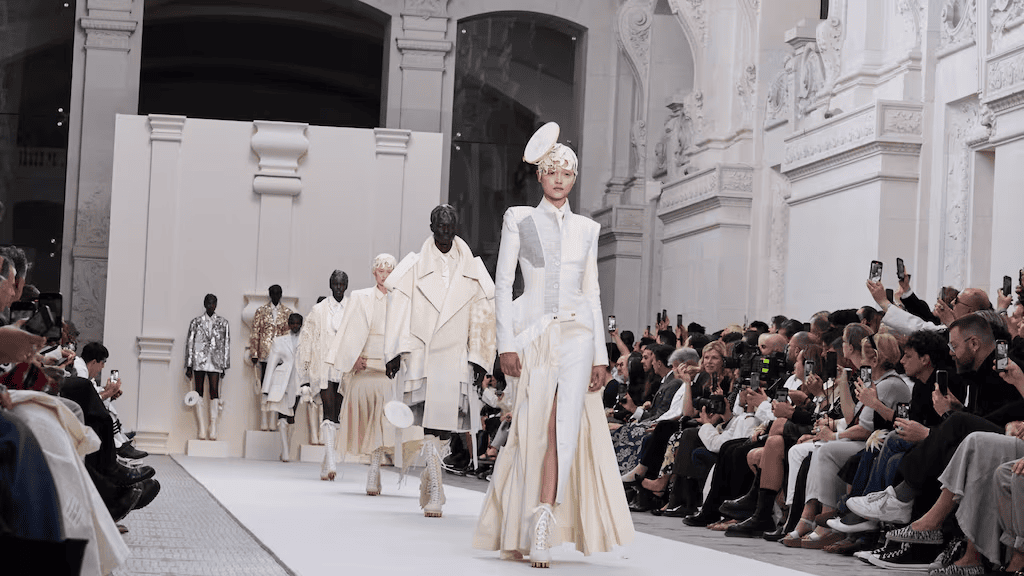Fashion Week is more than a dazzling display of the latest styles—it’s a powerful event that can send ripples through the stock market. As the world’s top designers showcase their new collections, savvy investors are tuning in, recognising that these events can have a meaningful impact on publicly traded companies, particularly in the fashion, luxury, and retail sectors.
In this article, we’ll explore how Fashion Week influences stock prices, highlight key stocks to watch, and uncover broader market trends that can provide investment opportunities during this glamorous season.

1. Fashion’s Financial Footprint
Fashion Week is a global celebration that takes place in major cities like New York, London, Milan, and Paris, attracting designers, celebrities, and influencers.
The Big 4New York Fashion Week
London Fashion Week
Milan Fashion Week
Paris Fashion Week
|
Yet, behind the glitz and glamour, there’s a financial undercurrent. Investors and market analysts keenly observe these events, knowing that they can significantly impact the bottom lines of publicly traded fashion brands.
When collections are well-received, brands can see a surge in popularity, leading to increased sales, enhanced brand value, and, ultimately, higher stock prices. Conversely, a poorly received collection or a shift in consumer preferences can negatively affect a company’s market position.
2. Key Fashion Stocks in the Spotlight
Certain stocks become particularly noteworthy during Fashion Week. These include luxury conglomerates, retail giants, and companies specialising in footwear and accessories. Let’s dive into some of the main players:
- Luxury Brands: Companies like LVMH (Louis Vuitton Moët Hennessy), Kering (owners of Gucci, Yves Saint Laurent, and Balenciaga), and Richemont (Cartier, Chloé) are key stocks to watch. These brands frequently dominate the runway with show-stopping collections.
For instance, a successful show featuring Louis Vuitton or Gucci can translate into increased consumer demand, particularly in markets like China, where luxury goods are highly coveted. For investors, positive media coverage and social media buzz from these shows can provide an early indicator of a stock’s upward trajectory.
Explore Luxury Brands Portfolio
- Retail Giants: Fashion Week isn’t just for the elite; it also has a trickle-down effect on mass-market retail brands like Inditex (parent company of Zara), H&M, and ASOS. These companies are quick to replicate runway trends, making high fashion accessible to the average consumer.
The speed and accuracy with which these brands interpret Fashion Week trends can directly impact their sales performance. If H&M, for example, quickly introduces a line that captures the essence of Paris Fashion Week, it could see a surge in same-store sales, positively influencing its stock.
- Footwear and Accessories: Companies like Nike, Adidas, and VF Corporation (which owns brands like Timberland and Vans) often see spikes in stock activity around Fashion Week, particularly if their products are featured in popular shows or collaborations.
For instance, a successful partnership between a designer and Nike could result in limited-edition releases that drive both sales and brand cachet, boosting investor sentiment.
3. How Fashion Week Impacts Stock Prices
Fashion Week can act as a catalyst for stock price movements in several ways:
- Increased Sales and Market Share: When a brand makes a memorable impression during Fashion Week, it often leads to heightened consumer interest and increased sales. For instance, after a standout show by Gucci, Kering’s stock often sees a bump, driven by a spike in social media mentions and a rise in searches for Gucci products online. This heightened visibility can lead to a stronger market share, particularly in fast-growing markets like Asia.
- Brand Perception and Investor Sentiment: The reception of a brand’s collection can heavily influence investor sentiment. Positive reviews and high-profile celebrity endorsements can lead to an uptick in stock prices. However, a misstep—a collection deemed out of touch or poorly aligned with current trends—can lead to a stock price dip as investors anticipate weaker sales or a diminished brand reputation.
- M&A Speculation: Fashion Week can also ignite mergers and acquisitions (M&A) speculation. If a smaller, up-and-coming brand gains substantial traction or buzz during Fashion Week, it may attract the interest of larger conglomerates looking to diversify their portfolio or target a new demographic. Such M&A activity often boosts the stock prices of the companies involved.
4. Investing in Fashion through ETFs
For those looking to gain exposure to the fashion sector without picking individual stocks, Exchange-Traded Funds (ETFs) can be a smart option. For example, the Global X MSCI China Consumer Discretionary ETF ($XLY) includes stocks of luxury goods companies that benefit from strong demand in China, a key market for fashion brands. Similarly, the S&P Global Luxury Index ETF ($GLUX.DE) focuses on a broader range of luxury goods and can offer a more diversified entry point for investors looking to capitalise on fashion trends without the risk of holding individual stocks.
Explore Consumer Discretionary ETF
5. Influence of Fashion Week on Related Sectors
Fashion Week’s impact extends beyond just fashion and retail stocks. Several other sectors benefit indirectly from these events:
- Textile Manufacturers: Companies that supply fabrics to fashion brands, like Unifi ($UFI) or Coats Group ($COA.L), can see increased orders following a successful Fashion Week season. This boost in demand can positively affect their stock prices as they ramp up production to meet new contracts.
- Logistics and Delivery: Stocks such as FedEx ($FDX), UPS ($UPS), or Deutsche Post DHL ($DHL.DE) can also experience heightened activity. These companies play a crucial role in transporting materials and finished goods, and a busy Fashion Week season means more business for them, potentially leading to a short-term uptick in their stock prices.
- Digital Platforms: In an age where fashion is increasingly digital, companies like Farfetch ($FTCHQ), Revolve ($RVLV), and Shopify ($SHOP) stand to benefit from the online traffic generated during Fashion Week. These platforms often host exclusive runway pieces and limited-edition collections, leading to increased sales and stock performance. For example, Farfetch has frequently reported higher sales during Fashion Week months, directly correlating to a rise in its stock price.
6. Sustainability and Emerging Trends
A significant trend reshaping the fashion industry is the growing emphasis on sustainability. As consumer preferences shift towards eco-friendly practices, brands that align with these values may see enhanced investor interest. Companies like The RealReal ($REAL) and Rent the Runway ($RENT), which focus on sustainable fashion practices, have gained attention as they align with the movement toward circular fashion.
Moreover, established brands that incorporate sustainable materials or practices in their Fashion Week collections often receive positive media coverage and investor sentiment. For instance, LVMH has committed to several sustainability initiatives, and their recent collections featured eco-friendly designs, which has been met with favorable responses from both consumers and investors.
7. Final Thoughts – Fashion Week as a Market Indicator
Fashion Week is not just a parade of beautiful clothes; it’s a significant market indicator that can influence stock prices across various sectors. As collections hit the runway and trends emerge, investors have the opportunity to gauge consumer sentiment and make strategic investments. Whether you’re watching the latest collections from Paris or tracking online retail sales spikes, keeping an eye on Fashion Week can provide valuable insights into market movements.
As Fashion Week continues to evolve, with an increasing focus on sustainability and digital transformation, its influence on the stock market will only grow. So, the next time you see a model strutting down the runway, remember: behind every outfit, there’s a financial story waiting to unfold.



